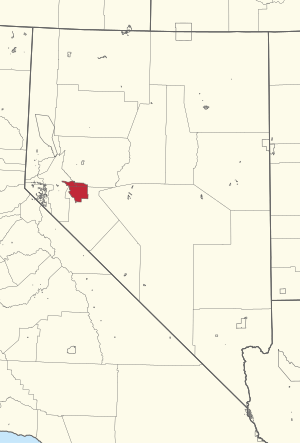Walker River Indian Reservation facts for kids
| Total population | |
|---|---|
| Enrolled members: 900 | |
| Regions with significant populations | |
| Languages | |
| English and Northern Paiute | |
| Religion | |
| Christianity | |
| Related ethnic groups | |
| Pyramid Lake Paiute, Northern Paiute peoples |
|
Walker River Indian Reservation
|
|
|---|---|

Location of the Walker River Indian Reservation
|
|
| Tribe | Walker River Paiute Tribe |
| Country | United States |
| State | Nevada |
| Area | |
| • Total | 1,372.62 km2 (529.970 sq mi) |
| Website | Walker River Paiute Tribe |
The Walker River Indian Reservation is an Indian reservation located in central Nevada in the United States. It belongs to the Walker River Paiute Tribe, a federally recognized tribe of Northern Paiute people.
The tribe represents two Northern Paiute bands, the larger Aga'idökadö (Agai Ticutta) ("Cutthroat trout Eaters") and the smaller Pakwidökadö (Pugwi Ticutta) ("Chub carp Eaters").
The reservation is located along the Walker River between Yerington and Walker Lake (in Northern Paiute: Hagi). At the current lake level, the reservation has only a small frontage on Walker Lake. The bulk of the reservation (72.68%) is in Mineral County; with portions in Lyon County (14.37%) and Churchill County (12.95%).
The reservation's land area is 529.970 square miles (1,372.616 km2). In the 2000 census, it had a resident population of 853 persons, and 746 persons in 2010. Schurz is the only town on the reservation. Wovoka, creator of the Ghost Dance important in the 19th century, is buried in Schurz.
Weber Reservoir, an impoundment of the Walker River, is located upstream of Schurz and provides irrigation water for farms on the reservation. Given the environmental conditions, most of the reservation is used for cattle range.
The Walker River Paiute joined with the Pyramid Lake Paiute tribe (two Northern Paiute bands: Kuyuidökadö (Cui Yui Ticutta): "Cui-ui-Fish-Eaters", and Tasiget tuviwarai: "Those who live amidst the mountains") in a 2016 civil rights suit in federal court against the state to secure polling places on their reservations. Otherwise members had to travel excessive miles to reach a polling place. Early voting for the 2016 elections at Walker River reservation started October 22, and during the first two days, turnout nearly equaled the total of all voters in the 2012 presidential election.

